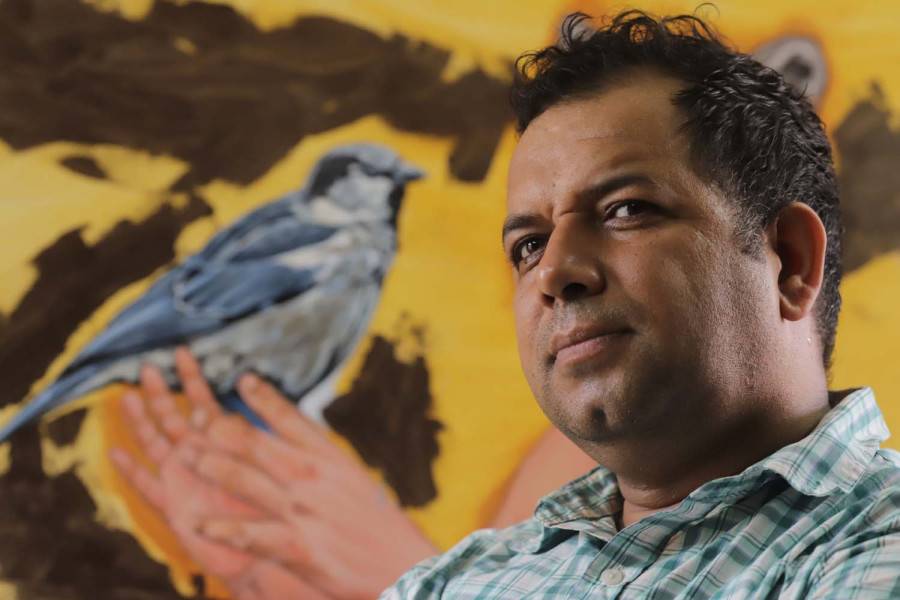Books
Reading influences the direction of films
Filmmaker Manoj Pandit emphasises literature’s role in understanding human nature and storytelling.
Sanskriti Pokharel
Manoj Pandit is a film-writer, producer, and director known for his works ‘Chhayan’, ‘Dasdhunga’, and ‘Badhshala’. He is also the author of ‘Cinemamanthan’. Pandit’s career is entwined with his love for reading.
Literature, as he explains, offers factual and imaginative data needed to understand human nature, emotions, and relationships—elements crucial to his storytelling.
In this conversation with the Post’s Sanskriti Pokharel, Pandit explains how he captures elements from literature into his films and how books have helped him grow.
As a filmmaker, what genres of books do you usually read?
Nonfiction plays an essential role in my filmmaking. I am drawn to books about historical events. These broaden my knowledge and help germinate new ideas that I can incorporate into the films I work on.
I also read books that attempt to blur the line between fiction and nonfiction. I tried such an approach in my film, ‘Dasdhunga’, which I have called docufiction.
How do you integrate themes from literature into the narratives of your films?
Literature has offered me decisive conflicts that I have integrated into my films. Both fiction and nonfiction provide individual and collective challenges, societal dilemmas, and struggles for resolution. These literary themes shape the discourse within my movies and give the foundational ideas that drive the narratives I create.
Beyond just themes, literature also fuels my imagination, allowing me to create worlds my characters inhabit and bringing depth to the stories I create.
What role do books play in helping filmmakers develop a deeper understanding of human emotions and relationships, as explored in ‘Chhayan’?
Books, news reports and journals written about the victims of child sexual abuse became my source for movies like ‘Chhayan’.
Books serve as valuable resources for filmmakers who seek to explore the complex dimensions of human emotions and relationships, which are central themes in many narratives, including this film.
Literature is, in a way, a bank of subjective and objective data. It encapsulates human experiences and emotions and provides insights into human needs, desires, and dilemmas. It also guides us to delve into the coexistence of contradictions, which helps filmmakers understand the nature of life in different times and spaces.
Such an understanding is crucial for filmmakers, as it allows us to create characters and stories that resonate with audiences emotionally, similar to ‘Chhayan’.
How do you think reading has shaped your perspective on social and political issues, as seen in your films like ‘Greater Nepal In Quest Of Boundary’ and ‘Dasdhunga’?
Reading has profoundly shaped my understanding of social and political issues, which is evident in my films, such as ‘Greater Nepal In Quest Of Boundary’ and ‘Dasdhunga’. ‘Teestadekhi Satalaj (Kagada) Samma’ and ‘Nepalko Simana’ were the books that inspired me to make the ‘Greater Nepal In Quest Of Boundary’.
Additionally, the investigative news reports and historical documents published about the Dasdhunga incident that took the life of politician Madan Bhandari instilled a fire-like passion in me to make a movie about this.
Literature has allowed me to empathise with various perspectives—those of victims, perpetrators, and the resilient. Through reading, I have gained a deeper understanding of the nature of power, politics, the human psyche, and the history of civilisation. This awareness has shaped my approach to storytelling and allowed me to portray the multifaceted nature of social and political issues with greater authenticity.
What advice would you give to aspiring filmmakers about the importance of reading and how it can enhance their creative process?
Great cinema begins with philosophy, not with a story. For aspiring filmmakers, the journey toward creating impactful cinema begins with a deep engagement with philosophy rather than merely focusing on narrative.
Understanding your philosophical beliefs is crucial to shaping the themes, premises, and stories you tell. Delving into philosophy clarifies your thoughts and convictions, influencing the characters you create and the conflicts that arise within your films.
A common challenge among filmmakers is the failure to recognise philosophy’s integral role in our lives and decision-making processes. As intellectual beings, our choices are influenced by our philosophical outlook.
I encourage them to explore books such as ‘Man's Search for Meaning’, ‘Tao Te Ching’, ‘The Art of War’, and ‘The Second Sex’.
Manoj Pandit’s five book recommendations
Sophie’s World
Author: Jostein Gaarder
Publisher: Farrar, Straus and Giroux
Year: 1995
This book is a mix of mystery and fantasy. Gaarder’s writing blurs the line between fiction and nonfiction, and his discussion of philosophy has greatly influenced me.
The Hero With A Thousand Faces
Author: Joseph Campbell
Publisher: New World Library
Year: 2008
Many of the greatest films follow the monomyth structure discussed in this book, which outlines a character’s journey. I strongly recommend all filmmakers read it.
Animal Farm
Author: George Orwell
Publisher: Secker and Warburg
Year: 1945
This classic political satire, set on a farm of anthropomorphic animals, introduced me to the nature of politics. It can be said that Orwell’s book expanded my understanding of human nature.
Thus Spoke Zarathustra
Author: Friedrich Nietzsche
Publisher: Oxford University Press
Year: 1883
It includes the German philosopher’s famous discussion of the phrase ‘God is dead’. Though people refer to him as a nihilist, I believe he is the most critical philosopher in Western philosophy.
The Buddha and His Teachings
Author: Narada Maha Thera
Publisher: Jaico Publishing House
Year: 2006
The author discusses concepts that form the foundation of Buddhism and offers detailed introductions to its teachings. The knowledge provided by this book feels immeasurable.




 15.87°C Kathmandu
15.87°C Kathmandu










